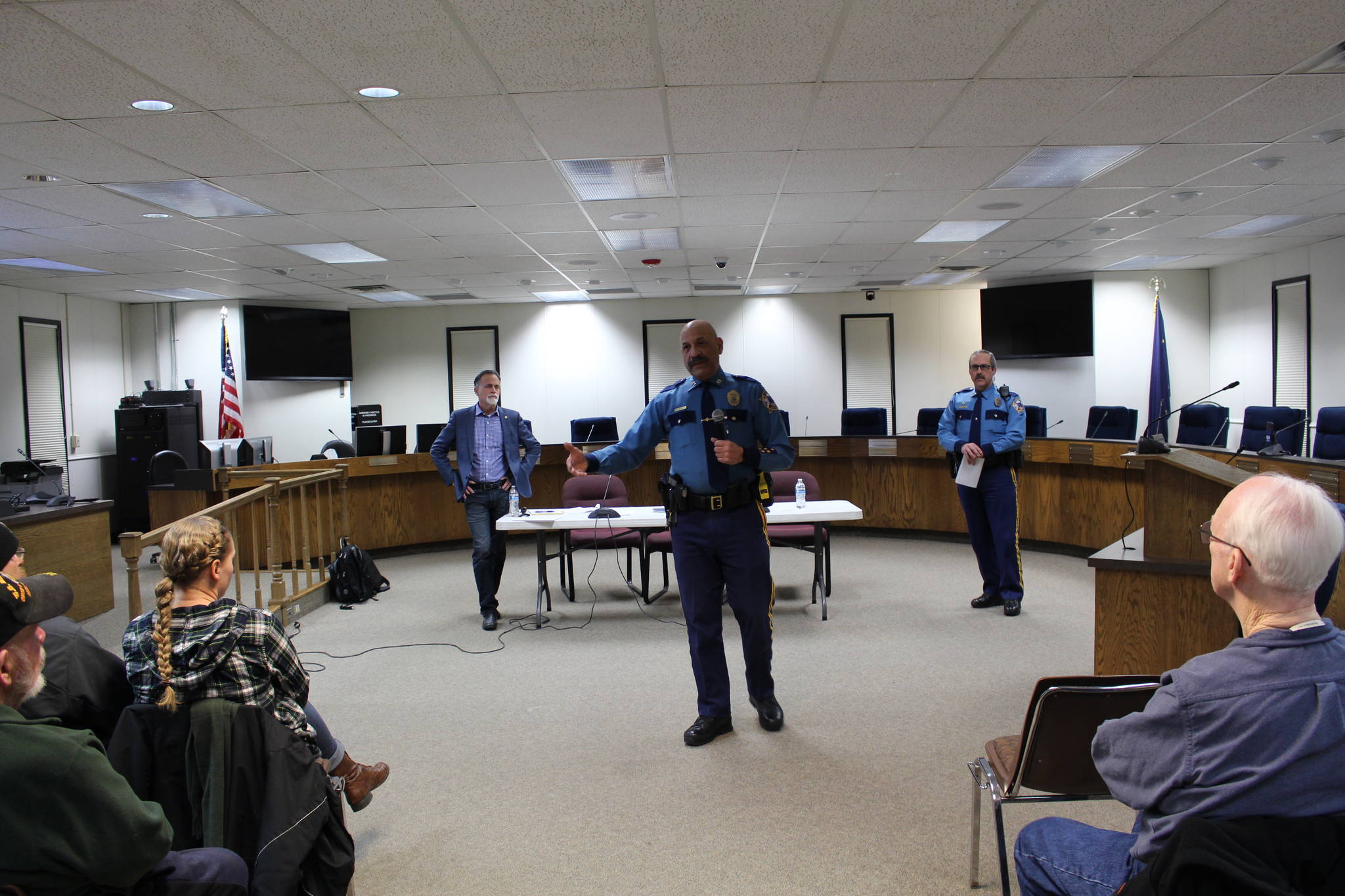In anticipation of the upcoming legislative session in Juneau, Sen. Peter Micciche, R-Soldotna, held a town hall Thursday night to speak to constituents about his priorities and answer questions about voters’ concerns.
Micciche’s town hall took place at the Betty J. Glick Assembly Chambers in Soldotna and drew a crowd of about 40 people. Micciche also streamed the town hall live on Facebook, which as of Saturday had been viewed by more than 3,200 people.
Micciche started by addressing the repeal of Senate Bill 91, a controversial crime bill that had most of its provisions removed with the passage of House Bill 49 last year. Micciche was involved in the passage of both of those bills and said that criminal justice is still a top priority for him going into this session.
Micciche invited Capt. Maurice Hughes and Lt. Mike Zweifel of the Alaska State Troopers to speak to the impacts that HB 49 has had on law enforcement efforts.
Hughes and Zweifel noted that one of the biggest differences they have seen was in cases of people driving with their license revoked. Prior to the passage of HB 49, this offense typically warranted a citation without arrest.
Since the passage of HB 49 and its enactment on July 11, 2019, which turned driving with a revoked license into a misdemeanor offense that constitutes arrest, Zweifel said that 168 of these misdemeanors have been charged on the Kenai Peninsula alone.
“Now each one of those 168 offenses now gives us the opportunity to look further into the stop and dig for other crimes,” Zweifel said. “And like the captain mentioned that’s where we get drug crimes, we get weapons crimes out of there, we find probation violations that are happening, and that allows us to be more effective.”
Micciche also touched on the fact that HB 49 made it so that possession of heroin or methamphetamine is a felony on the second offense. Micciche said that his version of the bill would have made the first offense a felony.
“By charging them now, first step misdemeanor second time a felony, not only do you have a way to get to the person trafficking those drugs but you’re also finally giving them incentive to turn their lives around. You’re giving them incentive to go for counseling, getting their treatment, hopefully becoming clean for the rest of their lives, becoming productive individuals in their community. Without that, they pay the ticket and go on, so we really had no way to move off of this cycle, which is killing so many Alaskans and destroying the lives of so many others.”
One member of the audience pushed back on the notion of treating drug addicts like criminals.
“Everyone here has someone in their family with an alcohol or a hard drug addiction,” the audience member said. “They are our neighbors … and I feel that we missed some of the ability to put some money into mental health and in support for getting out of drug addiction.”
Micciche said he also considers funding treatment options important but stressed the importance of charging possession as a criminal offense in order to go after drug dealers.
Micciche also focused on the state budget during his town hall and discussed what needs to be done to fix the “self-imposed recession” that he says has been caused by inaction on the part of the Legislature.
Micciche said that Gov. Mike Dunleavy’s proposed Fiscal Year 2021 budget includes six different options. The administration’s preferred option, Micciche said, includes a full statutory Alaska Permanent Fund dividend but has a shortfall of about $900 million.
“We’re all going to have to give up something,” Micciche said. “If any one group gets everything they want, something doesn’t work. This is going to have to be about compromise. I don’t care how conservative you are, I don’t care how liberal you are, if you get everything you want it doesn’t work mathematically.”
Micciche said the likely outcome for the budget would be a compromise that includes cuts in spending as well as additional sources of revenue. When it came to new forms of taxes, Micciche said that would be more inclined to support a sales tax or some other form of consumption tax than an income tax, and said that an income tax is still not likely to be popular within the Legislature.
Micciche also addressed another potential source of additional revenue that is being pushed from outside of the Legislature: the Fair Share Act ballot initiative. The initiative calls for a reform of Alaska’s oil tax structure and includes the repeal of the per-barrel credit that producers currently receive. Micciche is not in support of this ballot initiative, and said any policy proposal that can “fit on a bumper sticker” is not good policy.
“I am never going to say that I’m not willing to sit down and talk about tax policy, because I am,” Micciche said. “I just think it needs to be done in a very public setting with the right people that can give us the right information so that we can make decisions together as a state.”
Micciche answered more than a dozen questions from the audience at the end of the town hall, which ranged from concerns about drugs in schools to the prevalence of sexual assault across the state to questions about the legislature’s binding caucuses.
The full town hall can be found on Micciche’s Facebook page. Alaska’s legislative session begins Jan. 21.

